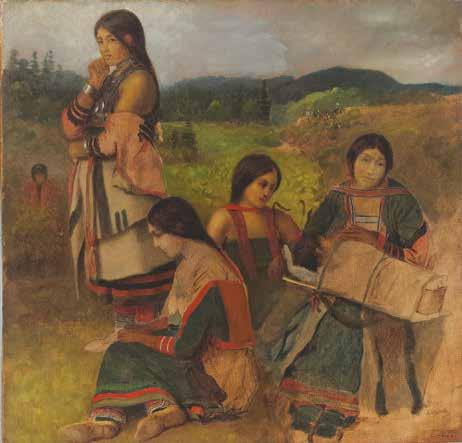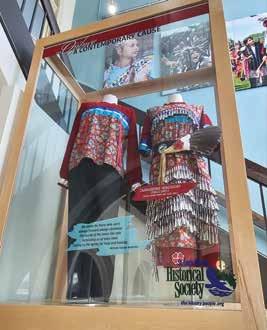
3 minute read
TRANSFORMINGJOINT REPLACEMENT WITH MAKO ROBOTIC ARM ASSISTED TECHNOLOGY
Wh en yo ur joi nt sw ear ou ta nd need re pl ac em en t, co nsi der an inno va ti ve ap pr oach. La ke wa lk Su rg ery Ce nt er no w of fe rs join tr eplac em en tu ti lizing Ma ko Sm artr obo tic s™ te ch nolo gy– en abl in gy ou to ha ve am or ep er sona liz ed and pr ec ise su rg ic al ex perienc e. Ta lk to yo ur sur ge on to see if Ma ko is th er igh to pt ion fo ry ou .

For Ojibwe women, environmental issues involving water are important since their role has always been as water keepers since water gives life and women are life givers, their babies surrounded by water in the womb.
Traditionally, songs and prayers are offered to water in daily life, but also in sacred times, like the Full Moon Ceremony, which honors women’s connection to water they sing, pray, heal and honor spirits together.
Part of preserving the right to hunt, fish and gather involves educating younger generations of Ojibwe, teaching outdoor skills. Children’s programming incorporates Ojibwe culture, too.
“We’ve always got those Ojibwe elders coming in, talking about traditional methods and how to do things in a spiritual way,” Beeksma said.
Historical role of women in Ojibwe culture
Even though Ojibwe women generally had a calm demeanor, their quiet observation “is not to be mistaken for being weak,” Beeksma said.
“Women always had a strong role within the community,” Beeksma said.
With councils for women, men, elders and youth, they’d discuss issues and if they wanted to take action, they’d need a consensus from the other councils, also.
Women were in charge of fishing, berries, maple sugar and wild rice, and the wigwam home “was her domain,” Beeksma said.
“Women have always been warriors,” she said. They fought alongside their husband and after he died, they’d usually take his place, avenging his death.
“There is a saying within Ojibwe culture that ‘we aren’t defeated until the grandmothers are defeated,’” Beeksma said.
Part of honoring strong women is honoring elders within the community.
“To us (elders) are very highly spiritual beings … like dignitaries,” she said.
The Ojibwe word for “elders,” “gichi-aya'aa,” even has respect built into the language; it means “great being.”
Celebration events
The American Indian Advisory Committee and Historical Society at the Depot offers space for non-Natives to learn and ask questions without fears of offending. In recent years, they’ve hosted events to celebrate Native American history with drums, traditional Ojibwe food and speakers teaching about Ojibwe history and culture. Events at the Depot are free and open to the public.
“Really the goal is to get accurate, respectful information out there,” Beeksma said.
The Fond Du Lac Band also has various events throughout November at Black Bear Casino Resort that are open to the public. They display historical items and Native dance troupes perform.
While November is officially National Native American Heritage Month, Jill Doerfler, department head of American Indian Studies at the University of Minnesota Duluth, advised against waiting until then.

The American Indian Community Housing Organization and the Fond du Lac Reservation Cultural Center & Museum are great starting places.
“The Tweed Museum of Art always has American Indian art in their Nelson case,” Doerfler said.
Doerfler also suggested reading books by local American Indian authors like Linda LeGarde Grover, and to watch the TV show ”Rutherford Falls.”
Doerfler suggested that students pursuing careers in education, social work, medicine or law would benefit from studying American Indian history, especially if they anticipate working with or for American Indians.
“It is not offensive to want to learn more about other cultures, American Indian or otherwise,” Doerfler said. “For more than a hundred years, the lack of representation and accurate information in the American educational system and popular culture has created and perpetuated problematic stereotypes.”
Education can minimize misconceptions and stereotypes.
In the Ojibwe culture, Doerfler said, she believes it’s “equally important for students to understand women’s historical roles in American Indian cultures as it is to understand our roles today and see the changes and continuities across time.”
Last words
American Indian peoples are not an old culture, but one that’s present today.
“We have vibrant contemporary communities,” Doerfler said.
“We’re still here,” Beeksma said, “We’re still a culture. We’re still evolving. We’re a living culture.”
Continuing education opportunities




• Fond du Lac Tribal and Community College offers an Associate of Applied Arts degree in American Indian Studies, which has transferable credits for further study in higher education.
• The University of Minnesota Duluth offers a Bachelor of Arts degree, with a major and minor in American Indian studies through the College of Liberal Arts.
• The University of Wisconsin-Superior offers a First Nations studies minor through its Human Behavior, Justice and Diversity Department. D
Molly Ovenden is a Duluth freelance writer.










